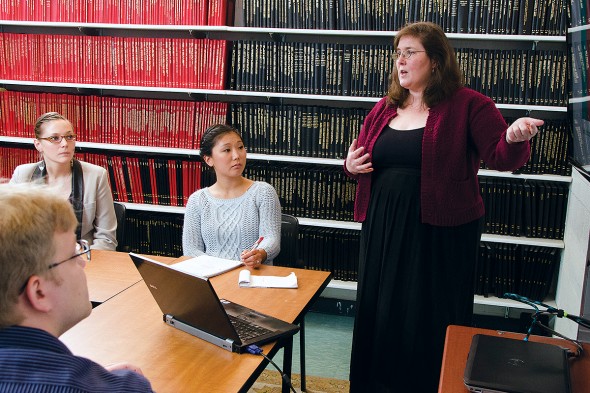Using humor to make science relevant, accessible

“I am happy when students leave my courses armed with new skills,” says psychology professor Jennifer Wiley. Photo: Joshua Clark/UIC Photo Services
Each year, UIC honors some of its most dedicated and outstanding teachers with the Award for Excellence in Teaching. The winners, who receive a $5,000 salary increase, are selected by past recipients of the award from nominations made by departments and colleges.
Cognitive psychologist Jennifer Wiley’s research explores questions about thinking — learning, problem solving, reasoning and language.
In the classroom, her goal is to make science relevant and accessible.
“Many features of my teaching come directly from research on effective learning, including using rich examples and humor to make key principles more memorable, and developing hands-on activities and small group activities so students can engage in active learning,” says Wiley, professor of psychology.
Her excellence as a teacher, mentor and researcher has been recognized with several UIC honors. She also received the National Science Foundation Career Award, a teaching award from the American Psychological Association’s Society for the Teaching of Psychology and the Alexander von Humboldt Foundation Senior Research Fellowship.
Wiley has directed hundreds of undergraduates and graduates in research and honors activities. She’s improved educational experiences for many more through curricular revisions and developing instructional material. “I am happy when students leave my courses armed with new skills, knowledge and interests in science,” she says. “On a broader scale, I feel privileged to serve as a mentor and measure success by helping students to reach their goals for after graduation.”
She received a bachelor’s degree in English from Duke University, but was drawn to psychology through a linguistics class that introduced her to methods of acquiring data to support language interpretation.
“Cognitive psychology takes this process one step further, with many tools such as eye-tracking and think-aloud protocols that help us to explore language processing,” Wiley says.
After graduation, she was research assistant for a psychology professor who studied giftedness and intelligence. Wiley went on to earn a doctorate in cognitive psychology from the University of Pittsburgh, where she was listed among the top 10 alumni of its Learning Research and Development Center in 2013.
Wiley says UIC is a great base for her research, particularly with current work that explores advantages that multilingualism, or living in more than one country, may have on cognition and creativity.
“Doing research in cognition at UIC is extremely important because much of what is in our textbooks is based on research collected at colleges that, at least in the past, were not very representative of the kind of diversity we see in major cities in the U.S.,” she says. “It is exciting to study which of these results may replicate, and which may not, when you consider a more diverse population.”
